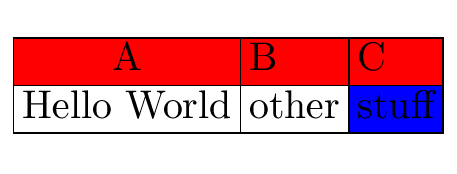主要因为 revtex 给 tabcolsep 增加了额外的间距,可以通过下面的代码修复:
\documentclass{revtex4-1}
\usepackage{colortbl}
\makeatletter
\def\CT@@do@color{%
\global\let\CT@do@color\relax
\@tempdima\wd\z@
\advance\@tempdima\@tempdimb
\advance\@tempdima\@tempdimc
\advance\@tempdimb\tabcolsep
\advance\@tempdimc\tabcolsep
\advance\@tempdima2\tabcolsep
\kern-\@tempdimb
\leaders\vrule
%^^A \@height\p@\@depth\p@
\hskip\@tempdima\@plus 1fill
\kern-\@tempdimc
\hskip-\wd\z@ \@plus -1fill }
\makeatother
\begin{document}
\begin{tabular}{ |c|l|l| } \hline
\rowcolor{red} A & B & C \\ \hline
Hello World & other & \cellcolor{blue}stuff\\ \hline
\end{tabular}
\end{document}
选自:https://tex.stackexchange.com/questions/102665/revtex4-1-and-colortbl-doesnt-fill-cells
看看下面的代码:
\documentclass{article}
\usepackage{mathtools}
\usepackage{eqparbox}
\usepackage[showframe]{geometry}
\begin{document}
\begin{flalign}
& & a &= bbbbbb &\nonumber \\
& & cccc & = dd & \text{(using Eq. 1)} & \nonumber \\
& & e &= f & \text{(using Thm. 2)}
\end{flalign}
\begin{flalign}
& & a &= bbbbbb \nonumber \\
& & cccc & = dd & \eqparbox{C}{(using Eq. 1)} & \nonumber \\
& & e &= f & \eqparbox{C}{(using Thm. 2)}
\end{flalign}
\end{document} 
测试了下,字符里面有UTF8 字符:
\documentclass{article}
\usepackage{tikz}
\usepackage[compat=1.1.0]{tikz-feynman}
\begin{document}
\feynmandiagram[horizontal=a to b]{
i1--[fermion] a--[fermion] i2,
a--[photon] b,
f1--[fermion] b--[fermion]f2,};
\end{document}mdpi 的最好有个完整代码信息。好确定。
每一个章节不同的时候,会增加间距的,可以看看 tocloft 宏包来修改距离看看。
\setlength{\cftbeforefigskip}{3pt}参考这里:https://www.latexstudio.net/index/details/index/mid/3025.html
这样是猜不出来的。
pdf 图片,就用 pdfcrop 裁剪掉空白。
这里有批处理命令:
https://flowus.cn/latex/share/66110e84-b24a-4cd5-b8a7-2ba2afb35a30
【FlowUs 息流】常用 LaTeX 代码
提供下完整代码或者是最到代码示例。
最好提供下完整的代码看看。
有没有具体复现的代码?
提问的时候要用md基本语法来提交代码,方便别人进行代码复用。
正常写
问 这样的图形应该怎么画?